

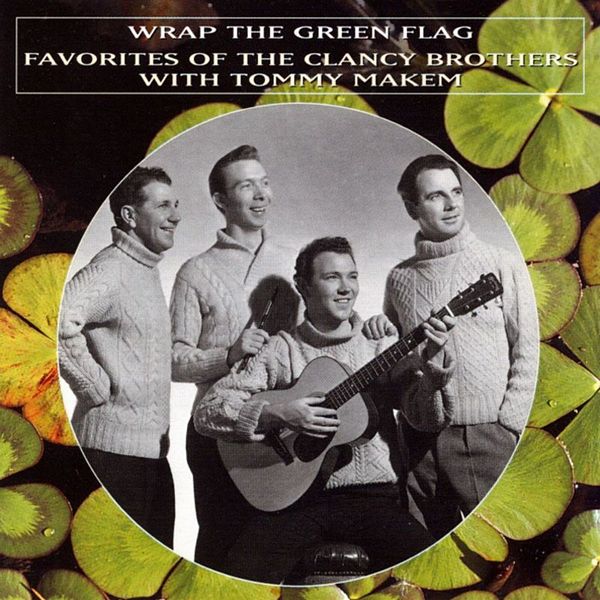 |
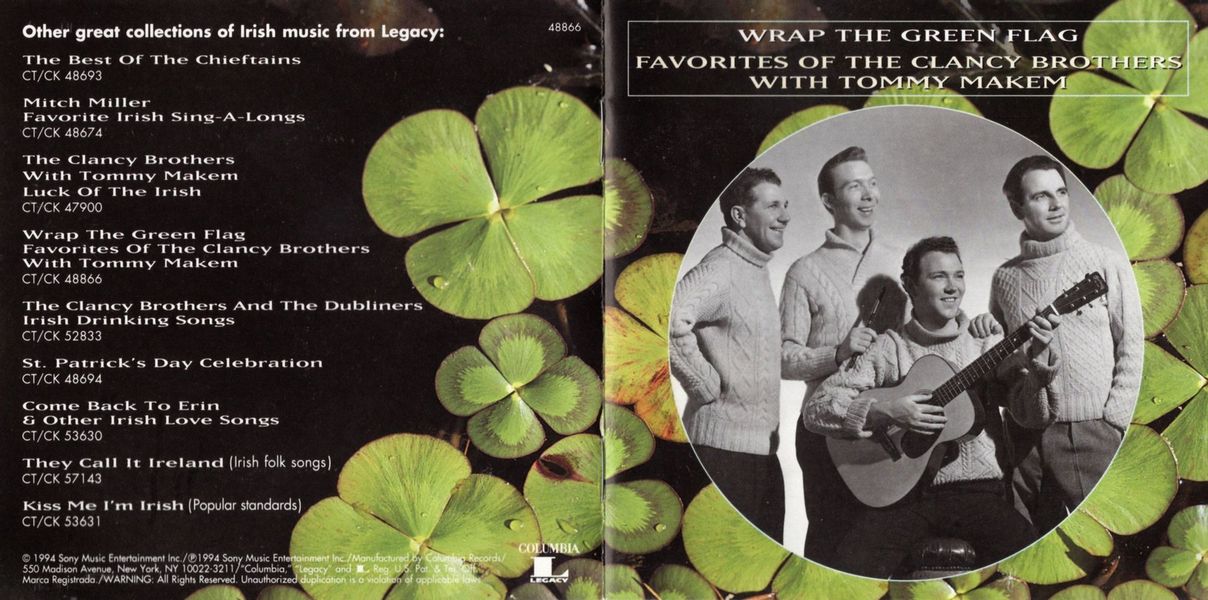
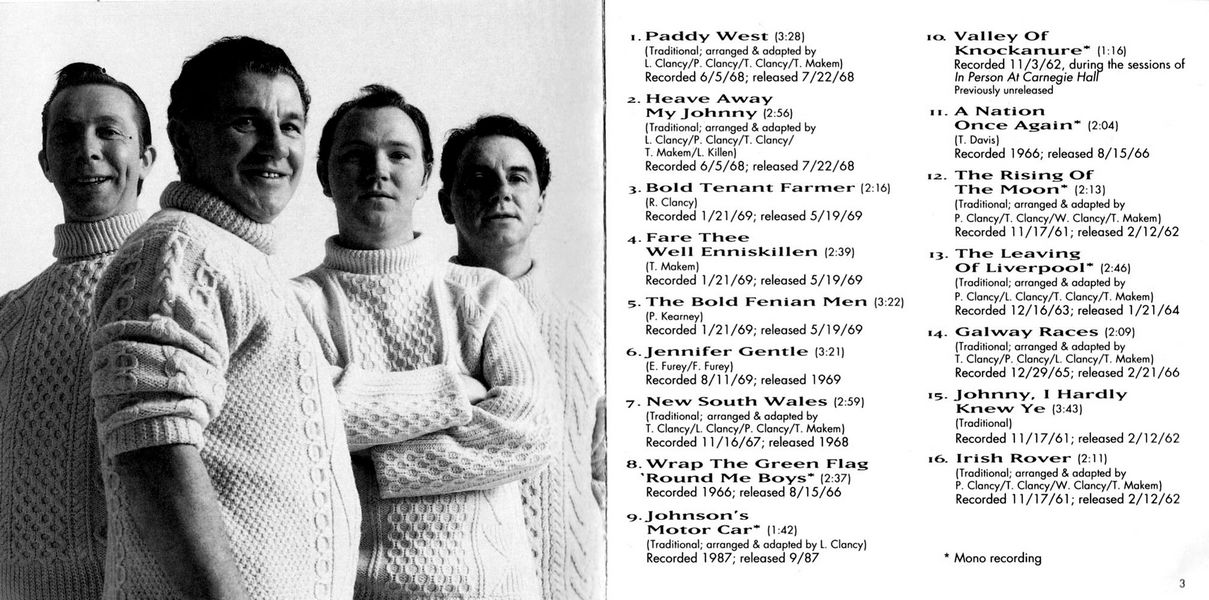 |
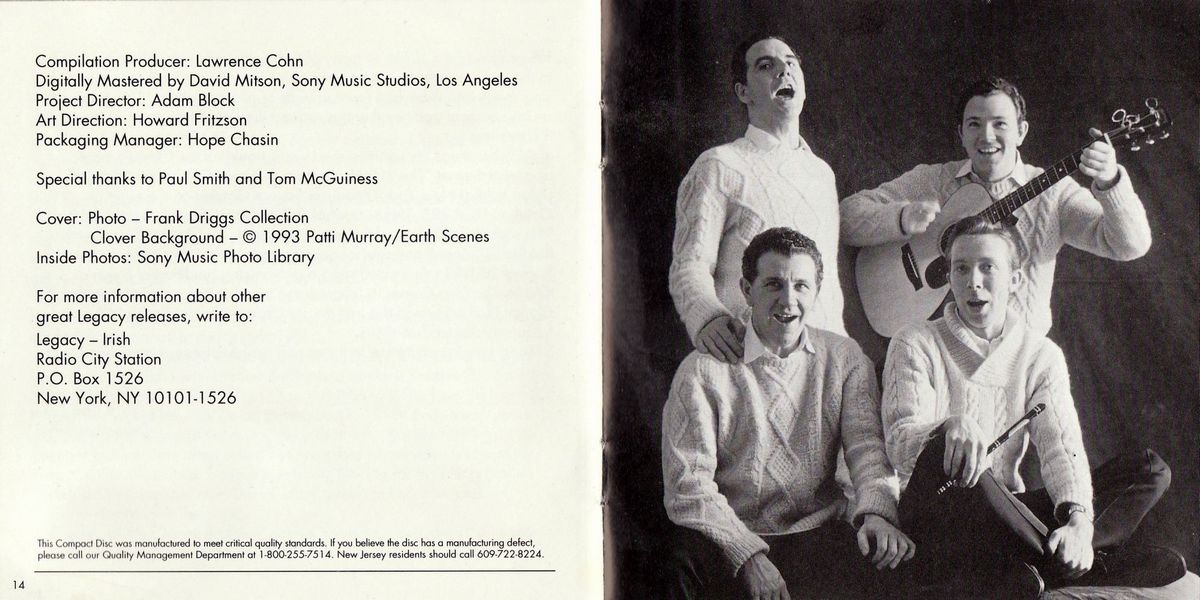
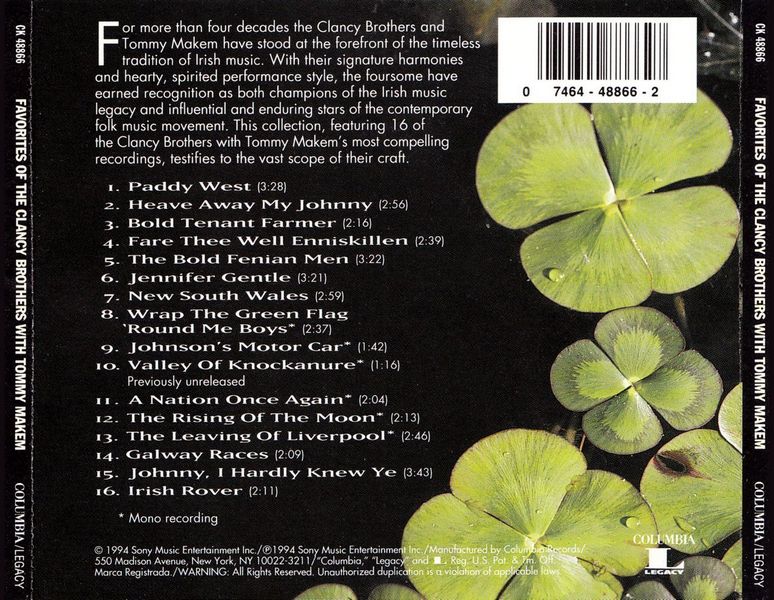
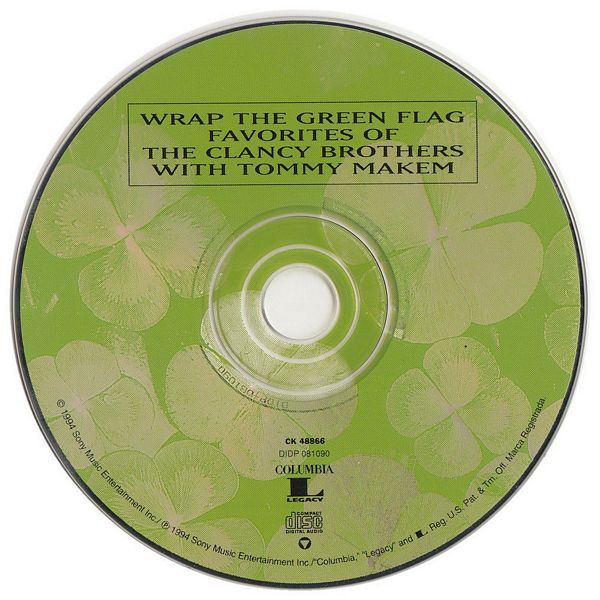 |
| more images |
Sleeve Notes
A Proud Legacy Of Irish Singing
"They just reached a lot of people with their exuberance, their attitude. Other than that, they're all great singers." Those words, spoken by Bob Dylan, have been echoed worldwide by countless fans of the Clancy Brothers and Tommy Makem since their memorable debut appearance in 1961 on "The Ed Sullivan Show," then the most popular variety program on American television. That night, attired in what would soon become their trademark, cream-colored, cable-knit Aran sweaters, Pat (more familiarly known as Paddy), Tom, and Liam Clancy along with their friend Tommy Makem belted out Irish songs with tremendous gusto, soaring harmonies, and an irresistible touch of theater, their professed first love. Originally slated to sing for just three minutes, they wound up singing live on camera for an unprecedented 16 minutes after one of the headliners unexpectedly took ill.
A high-water mark of that TV appearance, "Brennan On The Moor," would quickly become a signature song for the Clancys and Makem in concert. This anonymously written ballad captured all the defiant pride and dashing derring — do of a real-life Irish folk hero, highwayman Willie Brennan, who roamed the Kilworth mountain region of County Cork during the late seventeenth century. (Stirred by the way the Clancy Brothers and Tommy Makem sang this ballad on another occasion, Bob Dylan used the melody for "Rambling, Gambling Willie," a song he recorded for but did not include on 1963's The Freewheelin' Bob Dylan.)
Among the millions of TV viewers the quartet impressed with "Brennan On The Moor" and other native Irish songs was John Hammond, Sr., the legendary producer and talent scout for Columbia Records, who soon signed the three Clancys and Makem to a Columbia recording contract. Literally overnight, said Liam Clancy, "we found ourselves famous."
The road to "fame" traveled by the Clancy Brothers and Tommy Makem before 1961, however, was anything but a straight line. Born in Carrick-on-Suir, a small market town nestled along the River Suir in southeastern Tipperary, Pat, Tom, and Liam Clancy were three of nine children born to Robert Clancy and the former Joan McGrath. Finding work in Ireland during the 1930s and 1940s was as hard as it is today, so it was not surprising when the two oldest boys, Pat and Tom, opted for some adventure by joining the Royal Air Force in 1939. During World War II, Pat spent a couple of years as a flight engineer in India, while Tom flew missions over Germany. In the years following the war, the two brothers embarked on further adventures, with Pat at one time searching for emeralds in Venezuela and Tom performing with Ireland's Shakespeariana Internationale theater company for a brief period.
Spotty employment in Ireland and a renewed sense of wanderlust prompted both brothers to emigrate to America in 1950, making the journey by ship to New York City and then by train to Toronto. They stayed for a while in Canada, then headed south to Cleveland, where they had relatives and the prospect of better jobs. By day, both brothers worked in an auto body shop — Pat also worked for a while as an insurance agent — while at night Tom pursued his growing zeal for acting with the Cleveland Playhouse. An urge for still greener pastures motivated Pat and Tom to head west by car, but they got only as far as Chicago before deciding to reverse direction and head toward New York City.
There, in 1951, they eventually found off-Broadway acting jobs, and in the mid-1950s they rented the Cherry Lane Theatre in Greenwich Village to mount some of their theatrical productions. To help raise money, they held a series of Saturday midnight specials — impromptu folk concerts where they and some musical friends would sing mostly Irish songs centered on themes of rebellion, drinking, emigration, the sea, political and social history, love, wry humor, and a crackling good time for its own sake, songs they had learned and loved to sing at home in Carrick-on-Suir. These Saturday night folk concerts at the Cherry Lane Theatre attracted a public caught up in a folk-music revival growing in Greenwich Village.
By late 1955 and early 1956, when younger brother Liam arrived in New York with his friend Tommy Makem, who hailed from Keady, County Armagh, and was the youngest son of famed Ulster ballad singer Sarah Makem, the three Clancys and Makem together decided to record for the independent Tradition label formed by Pat Clancy. One of the first LPs they made, The Rising Of The Moon, came out in March 1956 and featured songs of Irish rebellion. Another early Tradition album was Come Fill Your Glass With Us, subtitled "Irish Songs of Drinking And Blackguarding," featuring the three Clancys, Makem, and fellow Greenwich Village resident musician Jack Keenan. (Interestingly enough, all five musicians pictured on the LP cover were wearing suits and ties. Those calling-card woolens would come later.) With these independently produced and rather speedily recorded albums, the Clancy Brothers and Tommy Makem had begun to fashion a distinctive recording and concert repertoire of songs to which they gave full, lusty voice in magnificent harmony.
The so-called folk scare of the middle to late 1950s was now gaining momentum, and the Clancy Brothers and Tommy Makem were in the right spot at the right time. That became patently clear on at least two occasions. The first was when the group was struggling to come up with a name for themselves. The Druids, the Bards, the Beggarmen, the Tinkers, the Moonshiners, and, yes, even the Chieftains were all seriously considered at one time or another. Still nameless, the four booked a six-week engagement at Chicago's Gate Of Horn club. Upon arriving at the club, they saw emblazoned on the marquee: "The Clancy Brothers and Tommy Makem."
The second occurred on the heels of a performance at Manhattan's Blue Angel club. That night, Blue Angel owner Jim Downey, former heavyweight champion Jack Dempsey, and a representative from "The Ed Sullivan Show" walked in together. The latter was so impressed by what he heard and saw that he helped book Pat, Tom, and Liam Clancy and Tommy Makem onto "The Ed Sullivan Show"a few weeks later.
A smash hit on TV, the quartet embarked on a highly successful singing career none of them ever envisioned. What they had begun in the late 1950s on a sometime basis — singing together for six months, then going their separate ways for one month to pursue their "proper work in the theater," explained Tommy Makem — became by the mid-1960s virtually a full-time professional commitment. Through the major-label exposure of Columbia and additional TV appearances, the four singers enjoyed sold-out concerts wherever they performed and record sales in the hundreds of thousands.
The first LP to show a picture of the three Clancys and Makem wearing their Aran sweaters was a Columbia release, A Spontaneous Performance Recording, featuring Bruce Langhorne on guitar and Pete Seeger on banjo. (The personal and professional mettle of the Clancys and Makem can be detected in the forthright front cover announcement of accompanist Pete Seeger, who was starting to emerge from the shadow cast by a McCarthyite blacklisting during the 1950s.) Liam Clancy fondly recalled the circumstances of how the quartet came to adopt their Aran sweater look. "We had a Jewish manager at the time, a man named Marty Erlichman, who wanted to package us somehow. When he saw the Aran sweaters our mother had sent us from Tipperary, he said, 'That's it!'" Tom Clancy likewise insisted that the four singers wear the sweaters while in concert, a shrewd bit of stagecraft that was not surprising from the most avid thespian in the group, one who had acted onstage with Helen Hayes in Eugene O'Neill's A Touch Of The Poet, Orson Welles in Shakespeare's King Lear, and Siobhan McKenna in George Bernard Shaw's Saint Joan.
But choice of singing, not clothing, material stamped the Clancy Brothers and Tommy Makem as leaders in the vanguard of an Irish folk music revival during the sixties. The songs they sung consciously skirted the arrant sentimentality about Ireland that was so popular and prevalent during the 1950s and focused instead on characters, places, and occurrences that sounded and felt authentically Irish because they were. Tin Pan Alley's often tin-ear take on Ireland and Irish America gave way, under the Gael force of the Clancys and Makem's vocals, to far more compelling and colorful songs such as "Down By The Glenside" (written by Dublin's Peadar Kearney, an uncle of playwrights Brendan and Dominic Behan and the author of "A Soldier's Song," Ireland's national anthem) and "Johnson's Motor Car" (a traditional melody wedded to lyrics written by Donegal's William Gillespie about an incident during Ireland's War of Independence that were adapted by Liam Clancy).
Individual members of the quartet also wrote or heavily reworked songs in the Irish tradition. "Fare Thee Well, Enniskillen," a traditional tune set to lyrics by Tommy Makem, stirringly tells of Irish men going off to fight in Spain and of their relief to return home once again. "Bold Tenant Farmer" is an anonymous ballad inspired by the struggles of Irish tenant farmers to comply with the ironhanded rent and eviction laws imposed by absentee British landlords in the 1870s, an oppressive economic system that spawned the Land League reform movement of 1879-'82, led by Michael Davitt and Charles Stewart Parnell. Rewritten and adapted by Bobby Clancy, who would join the Clancy Brothers group after both his brother Liam and Tommy Makem left, the ballad recounts the hardships and courage of the wife of a bold tenant farmer in Cork, who stood up to her landlord's son threatening eviction unless the rent was paid right away.
Songs of dire loss ("Valley Of Knockanure," sung solo by Liam Clancy here) and nationalistic fervor ("A Nation Once Again," written by Thomas Davis, a leader of the Young Ireland movement in the 1840s, and "Wrap The Green Flag 'Round Me Boys") were tempered by songs of tall-tale humor (consider the refrain of "shearing sheep as big as whales" in "New South Wales") and marvelously rich detail ("Irish Rover," in which the third verse catalogs the huge cargo of the ship, and "Galway Races," capturing all the pageantry of Irish horse racing). There were likewise occasional songs of a more contemporary flavor, such as "Jennifer Gentle," written by Eddie and Finbar Furey, who as members of the Furey Brothers and Davey Arthur would take their career cue from the Clancy Brothers and Tommy Makem. "If it weren't for those guys," Eddie Furey once remarked about the Clancys and Makem, "we'd all probably be on the dole."
Well-known singer and multi-instrumentalist Mick Moloney, who in 1967 joined the Johnstons, yet another Irish group at least partly influenced by the Clancys and Makem, vividly recalled the first time he saw the Clancys in concert. "I was 17 or 18 years old when they came to Limerick, and myself and a friend bought the first two tickets and sat in the front row in the Savoy Cinema in Limerick City. They bounded onto the stage and sang 'Brennan On The Moor.' They had a tremendous impact on me and on a lot of other people because of the excitement and flair and theatrical mode of presentation of their songs. I didn't know any traditional musicians at the time, but when the Clancy Brothers came along, if you were interested in any kind of folk music, you couldn't fail to be influenced by them." (Many years later, Moloney realized a long-standing dream of his to record a song with all or some of the Clancys — "Muldoon The Solid Man," featuring Paddy and Bobby Clancy with their nephew Robbie O'Connell, on 1984's Uncommon Bonds album for Green Linnet Records.)
Bob Dylan, an avowed fan of the Clancy Brothers and Tommy Makem, occasionally opened for them at Gerdes' Folk City and other Greenwich Village clubs during the early 1960s. "You know," readily admitted Dylan, "I wrote some of my own songs to some of the melodies that I heard them do." On 1964's The Times They Are A-Changin', Dylan used the melody of Dominic Behan's "The Patriot Game," a ballad he heard the Clancys and Makem frequently perform, for the song "With God On Our Side."
Such borrowings never really bothered the Clancys and Makem, who came from a musical tradition in which old tunes and songs were often altered to fit new circumstances and causes. The origins of many popular ballads can be traced to broadsides sold at country fairs or hawked by peddlers from door to door. If they caught on or were purchased in sufficient numbers, these broadsides were usually transformed into songs. They, in turn, became the people's music, their poetry, accessible and malleable, intended to be passed along mainly through oral transmission, where a wide latitude always existed. The putative ballad boom of the sixties in Ireland, a revival of the old songs among native and generally young Irish musicians, has often been attributed to the Clancy Brothers and Tommy Makem. But it is Liam Clancy who put the revival into brusque perspective: "It became respectable again for so-called respectable people to sing working-class songs."
In 1969, Tommy Makem departed the quartet to strike out on a solo career, and he was replaced by Louis Killen. (A musician who sat in on recording sessions with the Clancy Brothers and Killen around this time was guitarist and banjoist Don McLean, on loan from United Artists, for whom he had a #1 single in January 1972, "American Pie.") After Liam Clancy left the group in 1975 to forge a solo career of his own, Bobby Clancy joined with his brothers Pat and Tom and also their nephew, Robbie O'Connell, a talented singer and songwriter in his own right, to form a quartet that would continue to tour and record under the Clancy Brothers' banner.
As for Tommy Makem and Liam Clancy, they would eventually perform as a duo in the late 1970s and throughout most of the 1980s. The two had been close friends since 1955, the year they met by accident in Keady, where Liam was accompanying folklorist Diane Hamilton on a song-collecting visit to Sarah Makem, Tommy's mother. On May 20, 1984, Tommy Makem and Liam Clancy rejoined Pat and Tom Clancy for a special reunion concert by the original group at New York City's Lincoln Center. It had been 15 years since the original quartet had appeared together on a New York stage — Columbia Records' In Person At Carnegie Hall chronicled one of the last times they all performed together in concert — and the sold-out house at Lincoln Center reveled in seeing and hearing them sing out such classics as "The Leaving Of Liverpool," "Finnegan's Wake," and "The Holy Ground." A 28-city tour followed, reminding fans nationwide of the special music and presence these four native Irish singers have always offered so passionately and generously.
After the 1984 reunion tour, Pat and Tom Clancy returned to the road and recording studio with brother Bobby and nephew Robbie O'Connell. But by the end of the 1980s, Tom Clancy began to suffer from the stomach cancer that would take his life on November 7, 1990. Sixty-seven years old, the second eldest of the four Clancy Brothers, "the little bull" (as younger brother Liam often called him) was laid to rest near his home in Ring, County Waterford. Having previously filled in for his ailing brother during a 1990 summer tour, Liam Clancy put his solo career on hold again to reunite with the group.
The arc of the Clancy Brothers' career spans four decades and nearly 60 albums. But by no means should they be discounted as remnants of a folk era long past. Unlike so many of their contemporaries, who have faltered in the wake of changing times and tastes, the Clancy Brothers continue to sing songs that draw and rouse crowds of all generations. They celebrate an Irish musical tradition that has resisted the rust of time precisely because it is timeless.
Nowhere was the undiminished vocal power of the Clancys more apparent than at "The 30th Anniversary Concert Celebration" for Bob Dylan held at New York's Madison Square Garden on the night of October 16, 1992. There, at what Rolling Stone magazine later dubbed "the rock-and-roll party of the year," Pat, Liam, and Bobby Clancy with Robbie O'Connell and special guest Tommy Makem bounded on stage in front of 20,000 people and sang a galvanizing rendition of Dylan's "When The Ship Comes In." Somehow, it seemed especially fitting that the Clancy Brothers would dip into the songbag of someone who in the past frequently dipped into theirs.
Long may they continue to thrive and thrill audiences everywhere!
— Earle Hitchner
Irish Echo
December 1993
Notes
There are historical inacuracies in the above sleeve notes: Bobby Clancy was Tommy Makem's first replacement, and appeared on 3 ablums before Louis Killen joined the group. In Person At Carnegie Hall was not one of the "last times" the original group appeared together. It was their 3rd Columbia album, released in 1963.